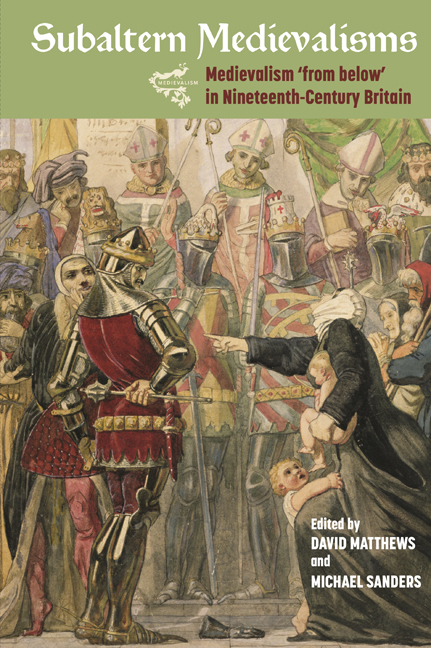Book contents
Introduction: Towards a Subaltern Medieval Unconscious?
Published online by Cambridge University Press: 09 February 2021
Summary
IN HIS 2015 novel Now is the Time, Melvin Bragg tells the story of the great rising of 1381 from the perspective of both the nobles and the rebels. The historical rebels were motivated by the imposition of a deeply unpopular poll tax by the government of Richard II. Marching on London from Kent and Essex, they sacked the Savoy palace of the widely disliked John of Gaunt, Duke of Lancaster and occupied the city. Confronting the rebels himself, Richard promised concessions. In a further meeting, the rebel leader Wat Tyler was killed; the rebels then dispersed and Richard went back on most of his promises, though there were some improvements in the lot of the peasants and the poll tax itself was dropped (not to be revived again, equally unsuccessfully, until the late 1980s). In Bragg's retelling the story ends, as it must, on a note of pessimism and tragedy. His sympathies are quite clearly with the rebels, and in a note he says that he wrote the novel out of a sense that the 1381 rebellion was one of the least known of English history.
This uprising used to be known as the Peasants’ Revolt. Historians have for some time resisted this – the social origins of the rebels were more diverse than the word ‘peasant’ suggests. But the idea, with its accompanying jokes about ‘revolting peasants’, has proved difficult to dislodge (this is why we have persisted with the term ‘Peasants’ Revolt’ throughout this volume, as this was how it was understood in the nineteenth century). Bragg is probably right to say that the event is less well known in the public consciousness than its importance would suggest it ought to be. His own novelistic version of Tyler is a rare phenomenon, in recent literature at least. Among legendary medieval English heroes, the name of Wat Tyler, unlike Robin Hood or King Arthur, is not one that provokes instant recognition.
Not long after the publication of Now is the Time, as the United Kingdom approached its deadline for leaving the European Union in March 2019, a leading figure in the right-wing anti-EU UK Independence Party, Martin Costello, drew on the rhetoric of the revolt, describing himself as a ‘modern-day Wat Tyler’.
- Type
- Chapter
- Information
- Subaltern MedievalismsMedievalism 'from below' in Nineteenth-Century Britain, pp. 1 - 16Publisher: Boydell & BrewerPrint publication year: 2021



